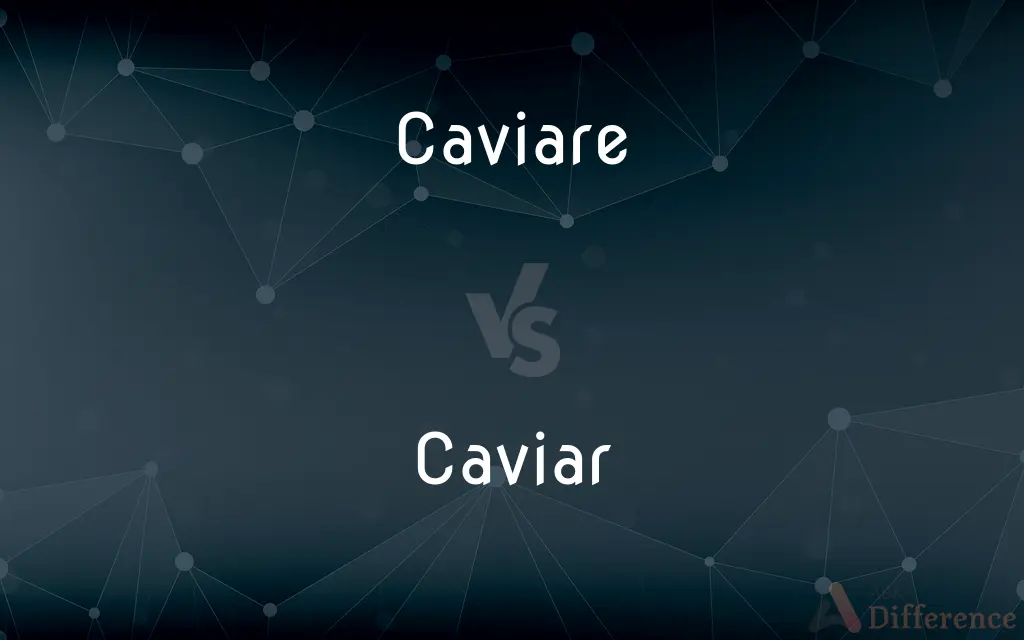Caviare vs. Caviar — What's the Difference?
By Fiza Rafique & Urooj Arif — Updated on April 29, 2024
Caviare is a less common spelling of caviar, referring to the salted eggs of sturgeon, primarily used in British English; caviar is the more globally recognized spelling.

Difference Between Caviare and Caviar
Table of Contents
ADVERTISEMENT
Key Differences
Caviare, used predominantly in British English, represents an older spelling variant of the same delicacy. Whereas, caviar is the universally accepted and more commonly used spelling across the globe, including in American English and international trade.
The spelling caviare might still appear in historical or traditional contexts within the UK, emphasizing a classic or regional preference. On the other hand, caviar is favored in modern usage, including culinary arts, commerce, and popular culture, signifying a standardization of the term.
In terms of pronunciation, both words are pronounced similarly, which indicates their shared origins and meanings. However, the spelling caviar is often perceived as more contemporary and is used in most culinary and luxury food contexts.
In literature and older cookbooks, one might still encounter the spelling caviare, reflecting its historical usage. Conversely, caviar is predominantly seen in current cookbooks, menus, and food literature, aligning with the global standardization of culinary terms.
When purchasing or researching this delicacy, the spelling caviar is more likely to yield broader and more relevant results due to its widespread acceptance and use. Caviare, while still understood, may be used stylistically or to evoke a traditional British setting.
ADVERTISEMENT
Comparison Chart
Usage
Primarily British
International, especially US
Spelling Preference
Traditional, less common
Modern, widely accepted
Context
Historical, traditional
Modern, commercial
Pronunciation
Same as caviar
Same as caviare
Searchability
Less searchable
More searchable
Compare with Definitions
Caviare
A traditional British English spelling of caviar.
The menu listed caviare, reflecting the restaurant's classic British influence.
Caviar
The salted eggs of various species of sturgeon, considered a delicacy.
He ordered caviar at the upscale restaurant.
Caviare
Occasionally used to imply an old-fashioned or classic style.
The caviare spelling in the novel set a historic tone.
Caviar
Predominant in modern culinary and luxury food markets.
Her blog about luxury foods frequently discusses the best types of caviar.
Caviare
Found primarily in historical texts or region-specific publications.
Her grandmother's recipe book includes a section on preparing caviare.
Caviar
Commonly used in international contexts and culinary references.
Caviar is often served with blini and sour cream.
Caviare
Salted roe of sturgeon used as a gourmet food.
We enjoyed a luxurious breakfast with caviare on toast.
Caviar
Searchable and recognized in contemporary literature and menus.
The gourmet food guide recommends several types of caviar for tasting.
Caviare
Represents a niche spelling choice in modern culinary arts.
The chef uses the spelling caviare to honor the dish's European origins.
Caviar
Represents a standardized spelling in global commerce.
The international summit featured caviar as a gourmet appetizer.
Caviare
The roe of a large fish, especially sturgeon, that is salted, seasoned, and eaten as a delicacy or relish.
Caviar
Caviar (also known as caviare; from Persian: خاویار, romanized: khâvyâr, lit. 'egg-bearing') is a food consisting of salt-cured roe of the family Acipenseridae. Caviar is considered a delicacy and is eaten as a garnish or a spread.
Caviare
Alternative spelling of caviar
Caviar
The pickled roe of sturgeon or other large fish, eaten as a delicacy.
Caviare
Salted roe of sturgeon or other large fish; usually served as an hors d'oeuvre
Caviar
The roe of a large fish, especially sturgeon, that is salted, seasoned, and eaten as a delicacy or relish.
Caviar
Roe of the sturgeon or of certain other large fish, considered a delicacy.
Caviar
(figurative) Something whose flavour is too fine for the vulgar taste.
Caviar
The roes of the sturgeon, prepared and salted; - used as a relish, esp. in Russia.
Caviar
Salted roe of sturgeon or other large fish; usually served as an hors d'oeuvre
Common Curiosities
Why is caviar more commonly used than caviare?
Caviar has become the standardized and internationally recognized spelling, used more commonly in global commerce and culinary contexts.
Can I find caviare in restaurants today?
It is uncommon, but caviare may be found in some traditional or historic British settings.
How should I spell caviar if writing for an international audience?
Use "caviar," as it is the spelling accepted and understood globally.
Is the pronunciation of caviare different from caviar?
No, both spellings are pronounced the same way.
What contexts might I still see the spelling caviare used?
Historical texts, traditional British publications, or when emphasizing a classic style.
How has the spelling of caviar evolved?
The spelling has evolved towards a standardization with "caviar" as the preferred form in contemporary usage.
Is there a difference in the product caviare and caviar?
No, caviare and caviar refer to the same product, the salted eggs of sturgeon, with the difference being in spelling preference.
What is caviare?
Caviare is an older British English spelling of caviar, referring to the salted roe of sturgeon.
Does the choice between caviare and caviar affect the meaning of the text?
It could indicate a stylistic or regional preference but does not change the underlying reference to the sturgeon roe.
What impact does using caviare have on search engine optimization?
Using "caviar" is more effective for SEO as it is more commonly searched globally.
Which spelling should I use in a formal culinary article?
Use "caviar" unless referring to a specific historical or traditional British context.
Can using caviare come across as outdated?
Yes, using caviare might be perceived as traditional or outdated in certain contexts.
Where might one encounter the caviare spelling in modern times?
It might appear in works that aim to capture historical or traditional British tones or settings.
Are there legal implications in using one spelling over the other?
No, there are no legal implications; it's purely a matter of orthographic preference.
What advice would you give to someone writing about this delicacy for an international cookbook?
Use "caviar" to ensure the cookbook appeals to a broader audience.
Share Your Discovery

Previous Comparison
Octagon vs. Hexagon
Next Comparison
Mature vs. OldAuthor Spotlight
Written by
Fiza RafiqueFiza Rafique is a skilled content writer at AskDifference.com, where she meticulously refines and enhances written pieces. Drawing from her vast editorial expertise, Fiza ensures clarity, accuracy, and precision in every article. Passionate about language, she continually seeks to elevate the quality of content for readers worldwide.
Co-written by
Urooj ArifUrooj is a skilled content writer at Ask Difference, known for her exceptional ability to simplify complex topics into engaging and informative content. With a passion for research and a flair for clear, concise writing, she consistently delivers articles that resonate with our diverse audience.
















































